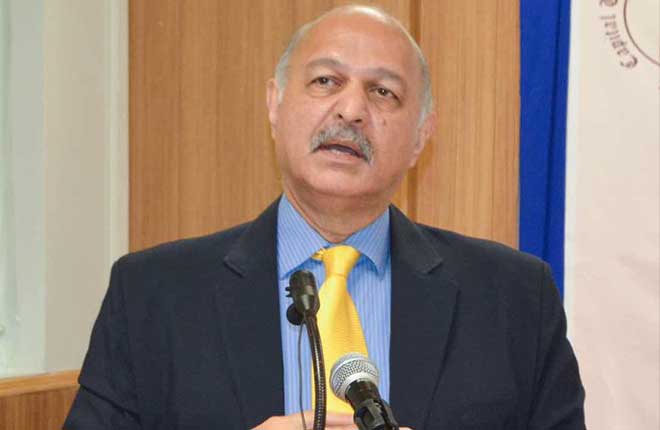CPEC enabling Pakistan’s shift to geo-economics, regional connectivity and peace: Senator Mushahid Hussain
During a webinar, ‘CPEC: Pakistan-China Security and Strategic Cooperation,’ Senate Defence Committee Chairman Mushahid Hussain said that CPEC has transformed Pakistan’s foreign policy from geo politics to geo-economics. Senator Hussain labeled Gwadar Port as the mainstay of the CPEC, and talked about how various CPEC projects are working for human development, especially by generating employment. He also highlighted that the G7 countries and other western powers have declared China as an emerging threat whereas, Prime Minister Imran Khan has reaffirmed Pakistan’s resolve that Pakistan will not bow to any external pressure. He also talked about the present situation in Afghanistan, and highlighted how Pakistan is working for regional peace under CPEC. The webinar was attended by other top-level academia and political representatives.
LAHORE: China-Pakistan Economic Corridor (CPEC) projects have been instrumental in shifting Pakistan’s focus from geopolitics to geoeconomics by boosting connectivity, commerce, trade, and cooperation in the region.
This was the focus of discussion at a conference organised by the Centre for Chinese Legal Studies (CCLS) at the Shaikh Ahmad Hassan School of Law (SAHSOL), LUMS. The virtual conference ‘CPEC: Pakistan-China Security and Strategic Cooperation’ was attended by Senate Defence Committee Chairman Mushahid Hussain, SAHSOL Head of Department Prof Uzair J Kayani, and CCLS Director Prof Sikander A Shah. Members of the Pakistan-China Institute and the LUMS community also attended the event.
Prof Kayani welcomed Senator Hussain as a key figure in recognising and promoting the importance of Pakistan and China’s relationship, when the world was witnessing enormous shifts in global policy.
Prof Shah moderated the discussion and highlighted the opportunities and pressing security challenges in relation to the CPEC.
Senator Hussain, while giving a comprehensive overview of the Pakistan-China relationship, explained that it was not limited to the CPEC flagship project. He spoke of President Biden’s multilateral approach aimed at managing China’s growing influence in the region, and globally.
In this vein, he highlighted the recently held Quadrilateral Security Dialogue between the United States, Japan, Australia, and India; the G-7 countries meeting; US-NATO summit, and the US-EU summit, each of which openly declared China as a global security challenge.
Senator Hussain also referenced the recent interview of Prime Minister Imran Khan with China Global Television Network, which reaffirmed the resolve that Pakistan would not succumb to any external pressure and downgrade its relationship with China.
The US withdrawal from Afghanistan, with its subsequent surge in violence, and the stalemate in intra-Afghan dialogue was also discussed by the senator. He also talked in detail about the CPEC projects that were instrumental in shifting Pakistan’s focus from geopolitics to geoeconomics.
He referred to Gwadar Port as the mainstay of the CPEC, which, in the words of Robert Kaplan, Chief Geopolitical Analyst, “has the potential to be the Rotterdam of the Arabian Sea”.
The completion of the first phase of CPEC projects, he explained, had brought monumental changes to the previously underdeveloped and ill-utilised areas like Thar. He also spoke of the second phase of CPEC that primarily focuses on agriculture, education, socio-economic development, special economic zones and the relocation of Chinese small and medium enterprises, which would further advance economic and human development in Pakistan.
He commented upon the growing strategic cooperation between Pakistan and China, where the latter has backed Pakistan’s efforts in the UN Security Council regarding various issues. He also highlighted the common challenge of hybrid warfare that both Pakistan and China faced from their adversaries, which could be overcome by dispelling the myths surrounding CPEC.
Senator Hussain concluded by referring to China as a crucial pivot in Pakistan’s general foreign policy and emphasising the tremendous potential of the CPEC in propelling infrastructural and human development in Pakistan.
He added that regardless of the challenges, they were surmountable given Pakistan’s strategic space in the region by virtue of CPEC, and the growing relationship with its neighbouring countries.
Prof Shah thanked the participants for attending the conference. He reiterated the importance of producing strong academic literature on the subject and holding constructive discourses surrounding CPEC and Pakistan-China strategic cooperation, which remains resilient even in testing times.
Chinese envoy Zhao Shiren urges students to uphold integrity and strengthen China-Pakistan ties
LAHORE:The Consul Generals from several countries and other distinguished guests attended …











